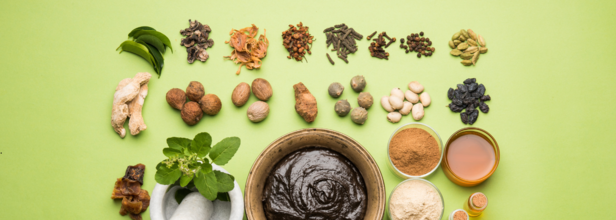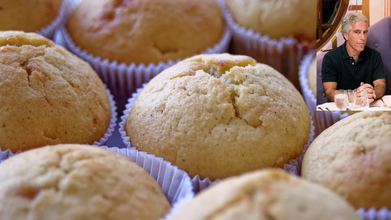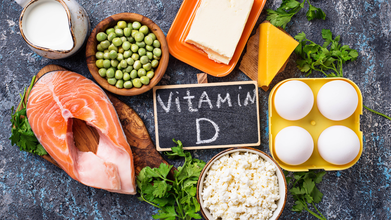- Health Conditions A-Z
- Health & Wellness
- Nutrition
- Fitness
- Health News
- Ayurveda
- Videos
- Medicine A-Z
- Parenting
12 Ayurvedic Herbs That Can Help You Heal Holistically

Credits: Canva
Ayurvedic herbs are used for many cures, and it could be a great way to holistic healing. These herbs are capable of treating anxiety, osteoarthritis, low testosterone, and high cholesterol, and other conditions. It is an alternative treatment, which prevents the illness rather than responding to the disease. Ayurveda is an ancient Indian healing system that focuses on creating a balance between mind, body, and environment.
Many of these herbs are used for detoxification, and are used in supplements. While the US Food and Drug Administration (FDA) does not regulate supplements the way it regulates prescription drugs, John Hopkins Medicine notes that Ayurvedic medicines are regulated as dietary supplements in the US. This means they do not need to meet the safety standards as medicines.
So, let's now delve into the 12 different Ayurvedic herbs that can help you heal.
Amla (Indian Gooseberry)
It is a fruit with antioxidant properties and is high in ascorbic acid or vitamin C and polyphenols. It can also decrease major lipids, including triglycerides, total cholesterol, low-density lipoprotein (bad cholesterol). Amla can also lower the atherogenic index of plasma, which is the ratio of triglycerides to high-density lipoprotein cholesterol (good cholesterol). Decreasing this ratio lowers your risk of heart diseases.
It is also anti inflammatory in nature and decreases the symptoms of gastroesophageal reflux.
Ashwagandha (Withania somnifera)
Also known as the Indian ginseng or winter cherry, it improves brain function. Research has shown that it could reduce anxiety and levels of stress hormones called the cortisol.
Brahmi (Bacopa monnieri)
It is purple in color, like a flowering herb, which is used to improve memory and cognitive functioning. As per a 2021 study, titled The effectiveness of Bacopa monnieri (Linn.) Wettst. as a nootropic, neuroprotective, or antidepressant supplement: analysis of the available clinical data, it was found that the participants who took brahmi saw an improved ability to pay attention, collect, store and recall information.
Cardamom (Elettaria cardamomum)
It is a herb that has antioxidant and anti-inflammatory properties in it. It is best used to beat a migraine and even could be used to alleviate nausea, vomiting and morning sickness during pregnancy.
Guggul (Commiphora mukul)
It is a gum resin from drying the sap of Commiphora or Boswellia shrubs. It is also associated anti inflammatory benefits and helps with diabetes, arthritis, and inflammatory bowel disease.
Garlic (Allium sativum)
It is a common spice that is used in Indian household and has been shown to lower total and LADL cholesterol levels by 5 to 6%.
Guduchi (Tinospora Cordifolia)
It is also called giloy, and it is also used to treat a variety of conditions and diseases including diabetes, stomachache, jaundice, urinary problems and dysentery.
Neem (Azadirachta Indica)
This is a go-to for everything in the Indian household. You have cold? Drink Neem juice. You are on diet? Drink Neem juice. You have pimples? Add Neem in your palette. It is also a great way to keep insects or any bacteria away.
It has potent antioxidant effects and has many benefits.
Shatavari (Asparagus racemosus)
It is the go-to herb for maintaining PCOS, as it is used to maintain homeostasis. It was also traditionally used to promote lactation and increase fertility.
Turmeric (Curcuma Longa)
It is a plant in the ginger family that is the main ingredient to make curry. It has many benefit, including skin health. It brightens your skin and also decreases inflammation.
Triphala
It is a botanic formula which contains three different herbs, including terminalia bellirica, terminalia chebula, and amla. It is used for gastrointestinal tract disorders.
Tulsi (Holy Basil)
This has been studied in small clinical trials for its effects on cognitive health. It is also like a go-to in the Indian household, which is added in beverages and food, for taste and health benefits, including beating a cold.
Bird Flu In India: How Safe Is It To Eat Chicken And Eggs?

Credits: Canva
Bird Flu In India: Amid bird flu fears from Bihar's Bhagalpur district in Naugacha, where over 150 crows were found dead, new concerns are being raised around poultry products. Chennai too is facing a high bird flu alert, there too, dead crows were found. This is why it is important to know how to consume poultry safely and what all to keep in mind while handling poultry.
While there is no confirmation yet in if it has spread in chicken, India has seen previous cases of avian flu in chicken. Here's what you should know about consuming poultry.
Bird Flu In India: How To Consume Poultry Safely?
Pasteurization and cooking them at high temperatures can curb the threat. It is also important to handle your poultry products when you are buying and storing them.
Also, avoid drinking raw milk to kill avian influenza A(H5N1).
Bird Flu In India: How To Handle Chicken While Shopping?
The meat juice can spill over and contaminate other food items, therefore it is extremely important to store it properly, in a way that it does not contaminate another food item. Always store it in a cool bag when you are transporting it and refrigerate and freeze the meat for the first two hours of buying.
You must also cook your chicken so the viruses do not survive on the chicken.
Read: How To Eat Eggs Safely?
Bird Flu In India: Is It Safe To Eat Chicken?
Yes, chicken and eggs are still safe to consume, as long as they are thoroughly cooked. Cooking chicken to the internal temperature of at least 165°F kills bacteria, viruses, and other germs, such as H5N1. The most accurate method of assuring that food is cooked is to use a meat thermometer.
Safe food handling is crucial:
- Maintain a hygienic kitchen by disinfecting countertops and washing hands both before and after touching raw meat.
- Prevent cross-contamination by employing distinct cutting boards and utensils for raw and cooked food.
Bird Flu In India: How to Handle Eggs And Consume It Safely?
Flu viruses can infect chicken eggs by entering through the eggshell. The eggshells are smaller than the pores of eggshells, which means viruses can enter the eggs and the egg's surface will still be protected. However, it is still important to handle it safely.
As per the US Food and Drug Administration, cooking poultry, eggs and other animal products to the proper temperature and preventing cross-contamination between raw and cooked food.
Reject suspect eggs that are small, soft-shelled, or deformed since these may be a sign of infection in hens, though infected birds usually discontinue laying eggs before the situation gets worse.
What Should You Avoid?
- Raw or undercooked chicken
- Raw or soft eggs
- Raw milk and unpasteurized dairy products
- Cross-contaminated foods
- Meat from unregulated sources
Safest Way to Cook Eggs
While pasteurized eggs have a lower risk of infection because pasteurization effectively kills viruses, including bird flu, and bacteria. When cooking eggs, FDA officials advise:
- Washing hands, utensils,, and work surfaces with hot, soapy water before and after touching raw eggs.
- Cooking eggs until both the yolk and white are firm.
- Making sure scrambled eggs are fluffy and not runny.
- Cooking casseroles and other dishes with eggs to 160 degrees Fahrenheit.
- Serving cooked eggs right away. Don't leave egg dishes out for more than 2 hours.
- Using an insulated cooler to transport eggs and egg products for picnics or gatherings.
- Reheating any leftover egg products from the fridge to 165 degrees Fahrenheit.
Epstein Files Reveal Secret Muffin Recipe: All You Need To Know

Credit: Canva
As the United States Department of Justice continues to release the harrowing Epstein Files that lift the lid on years' worth of horrific crimes by the convicted American child sex offender, serial rapist and human trafficker, eagle eyed readers have noticed a unique breakfast item in the documents.
In a file titled 'J.E.E Operating Manual', experts found a 11-step muffin recipe named 'J.E.E. Muffin Recipe' that the felon insisted should be served to him every morning at 6.30am.
The Epstein files are over six million pages of documents, images and videos detailing the criminal activities of the financier and his social circle of public figures that included politicians and celebrities.
His co-conspirator Ghislaine Maxwell, who is also a convicted child sex trafficker and sometimes referred to as the "Lady of the House" is serving a 20-year prison sentence at a minimum-security prison camp in Texas.
What Is The J.E.E. Muffin Recipe?
To start off, the recipe involves 12 ingredients which are:
- 4 extra large eggs
- 3 cups Dark brown sugar
- 3/4 cup Olive Oil
- 4 cups Digestive Bran
- 5 cups Whole Wheat Flour
- 12/ cup Ground Flax Seed Mixture
- 12/ cup Flax Seeds
- 5 tsp. Baking Soda
- 1/4 tsp. Salt
- 1 cup Raisins
- 4 cups Whole Milk
- 1 tsp. Vanilla Extract
1. In a large bowl combine bran, flour, flax seeds, baking soda and salt
2. Beat eggs and sugar in the bowl of an electric mixer until thick and creamy.
3. Add oil to egg/sugar mixture and mix to combine. Also combine milk and vanilla and set aside.
5. Add flour and milk mixtures to egg/sugar mixture, alternating additions until combined. Do not over beat mixture.
6. Add raisins and stir until incorporated.
7. Pour mixture into an airtight plastic container and store in the refrigerator for 24 hours before using.
8. Grease large muffin tin with Pam Spray.
9. Fill tins to the top with mixture and top with chopped nut/sugar/flax .
10. Bake at 350 degrees F. for 35-45 minutes.
11. Combine chopped pecans, walnuts and almonds, wheat germ, flax seeds and brown sugar for muffin toppings
While public speculation runs rampant over why this digestion-friendly muffin recipe was a critical part of Epstein's daily routine, as many allege and theorize that it was fed to the children on his island, nutritionists claim that this bran-packed muffins can help your body in multiple ways.
Why Is This Muffin Recipe Good For Your Gut?
Dr. Anshul Singh, Team Lead, Clinical Nutritionist, Artemis Hospitals noted that this baked good is packed with tons of fiber, omega-3, iron and antioxidants, all of which are extremely beneficial for the body.
He tells Healthandme: "People often call this muffin recipe a high-fiber muffin and it is good for your health in small amounts. The fact that this recipe has a lot of fiber is its best quality.
"Digestive bran, whole wheat flour, ground flaxseed and whole flax seeds are all high in dietary fiber. Fiber helps with bowel movements, constipation and overall gut health. Fibre makes stool thicker which makes digestion easier and more regular.
"Flaxseeds also have omega-3 fatty acids which can lower inflammation and improve heart health. Raisins add natural sweetness, iron and antioxidants while eggs and milk add protein that keeps you full longer. Olive oil has healthy fats that help with digestion and the absorption of vitamins that dissolve in fat.
"These muffins might help people who have trouble with slow digestion or irregular bowel movements, especially if they drink enough water with them. But calling them detox or clean-out foods can be misleading. The liver and kidneys are two of the body's organs that help get rid of toxins. The fiber in these muffins is what really helps the digestive system work better.
"The recipe has a lot of sugar and fiber, so it's important to watch how much you eat. A muffin can be a filling, easy-to-digest snack instead of a cure-all."
However, Zoha Shaikh, Consultant Nutritionist at Nutriiya, warns that these muffins may also cause stomach issues including bloating, gas, acid reflux and diarrhea.
She told this publication: "This muffin recipe is rich in fibre and may help relieve constipation in individuals with low fibre intake. However, the combination of very high fibre, sugar, and milk can also trigger bloating, gas, abdominal cramping, loose stools and acid reflux especially in sensitive individuals.
"The high use of baking soda contributes to increased sodium load, making it unsuitable for people with hypertension. From a clinical nutrition perspective, replacing wheat bran with oat bran, reducing baking soda, moderating flaxseed quantity and adding psyllium husk can make the recipe more gut-friendly. Eggs and psyllium together also improve texture and fluffiness while being gentler on digestion."
Is February Feeling Gloomy Without Sunlight? Add These Foods In Your Diet To Avoid Vitamin D Deficiency

Credits: Canva
February often feels like winter’s longest stretch. The days are short, the sun rarely breaks through the clouds, and many people find themselves feeling unusually tired or low. Health experts say this is also the time of year when vitamin D deficiency tends to surface, especially in regions with limited winter sunlight.
While vitamin D is best known for its role in bone health, its impact goes far beyond that. As sunlight exposure drops in late winter, attention is turning to how diet can help support the body until brighter days return.
Why Vitamin D Matters for the Body
Vitamin D plays a key role in several essential functions. It helps the body absorb calcium, which is crucial for maintaining strong bones and teeth. It also supports normal muscle function and keeps the immune system working efficiently.
What is less widely discussed is its role in brain health. Vitamin D receptors are present in many areas of the brain, and low levels have been linked to changes in mood and energy. During winter, many people report feeling sluggish, unmotivated, or emotionally flat. While these symptoms are often blamed on stress or lack of sleep, reduced sunlight and falling vitamin D levels may also contribute.
Why Winter Increases the Risk of Deficiency
The body produces most of its vitamin D when the skin is exposed to sunlight. In winter, shorter days, heavy clothing, and more time spent indoors mean that this natural process slows down significantly. Even people who eat well can struggle to maintain optimal levels during prolonged periods of low sun exposure.
This is where food choices can offer some support, even if they cannot fully replace sunlight.
Fatty Fish as a Natural Boost
Salmon is one of the richest natural sources of vitamin D. It also provides high quality protein and healthy fats that support heart and brain health. Simple meals like oven baked salmon with potatoes and broccoli or a salmon rice bowl with vegetables make it easy to include in weekly meals.
Herring is another strong option. It contains both vitamin D and omega 3 fatty acids, which are known to support heart health. Traditional combinations such as herring with boiled potatoes or a light yogurt based sauce are both nourishing and filling.
Everyday Foods That Add Up
Eggs also contribute small amounts of vitamin D, mainly from the yolk. While they do not provide as much as fatty fish, they are easy to include in daily meals. Scrambled eggs, vegetable omelettes, or a soft boiled egg at dinner can all help increase intake over time.
Mushrooms are one of the few plant based foods that contain vitamin D, especially when they have been exposed to light. They are not a replacement for fish but can be a helpful addition for those who eat little or no seafood.
Food Helps, but Sunlight Still Matters
Nutrition can support vitamin D levels during winter, but it cannot fully make up for the lack of sunlight. Most vitamin D is still produced through the skin, not the diet. Experts advise making the most of daylight when possible, even short walks outdoors, while using food as a supportive measure until spring arrives.
© 2024 Bennett, Coleman & Company Limited

